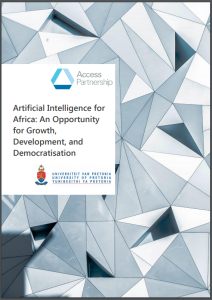The rapidly developing set of artificial intelligence (AI) technologies has the potential to solve some of the most pressing challenges that impact Sub-Saharan Africa and drive growth and development in core sectors:
- Agriculture will be done more efficiently and effectively, raising yields.
- Healthcare will be bettertailored, higher quality, andmore accessible, improving outcomes.
- Public services will be more efficient and more responsive to citizens, enhancing impact.
- Financial services will be more secure and reach more citizens who need them, expanding access.
Forward thinking policy-makers, innovative startups, global technology partners, civil society groups, and international global stakeholders are already mobilising to promote the growth of a vibrant AI ecosystem in Africa. However, there remain structural challenges that can hamper the development of a healthy AI ecosystem in Africa:
- Education systems will need to adapt quickly, and new frameworks need to be created for workers and citizens to develop the skills they need to thrive.
- Broadband coverage will need to expand rapidly — specifically in rural areas — in order for all citizens and businesses to reap the benefits.
- Ethical implications regarding the fair, secure, and inclusive use of AI applications also must be addressed through collaboration and engagement to ensure AI systems earn trust.
- Ensuring a deeper, broader, and more accessible pool of data is available will also be key to enable researchers, developers, and users to drive AI.
As with other transformative and revolutionary technologies, there are challenges inherent in the development of AI. Governments can embrace these challenges and benefit from AI by creating clear roadmaps to guide the adoption of this technology. They should recalibrate their laws and legal frameworks to support data-driven technologies and innovation-driven growth; strengthen the supporting infrastructure for development; and set the tone of a collaborative approach that allows all stakeholders to share their expertise, insights, and build trust. With the right mix of policies, Africa and its citizens can reap the benefits of the transformations in the years to come.
Download this whitepaper to learn more about the opportunities and challenges for AI in Africa.
